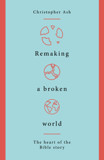
How do you feel about your local church? (Answer honestly!) It may be the place you feel happiest—a place of respite from the rest of life—where you love to worship and serve alongside a group of like-minded people. Or it may be a place where you feel the pressure of relentless rotas, teaching and leading, serving and sacrificing. Perhaps your feelings lie somewhere in between...
However you may feel about the place and the people you call church, it’s fair to say that sometimes our weekly routines of setting up chairs, plugging in the sound-desk, making coffee, teaching the children, running the crèche and listening to God’s Word together can feel quite, well... ordinary. It can be easy to lose sight of our calling amidst the commonplace. And to miss the significance of our weekly gatherings when we become preoccupied by the familiar—and seemingly unexceptional—routines that we follow.

Discover God's plan for mending our broken world and your part in it.
It’s exciting to be reminded by Christopher Ash in Remaking a Broken World, therefore, that the whole sweep of the Bible story points to the local church as a place in which God’s vision for remaking our broken and fractured world is focused. Incredibly, we are the means by which God is gathering together that which is fractured; but more than that, “the glory of God is inseparably tied up with what happens in the local church.” (Christopher Ash)
That means that you, and I, and all of the apparently ordinary things that we do on a Sunday morning (and during the week) are central to God’s plan to remake our hurting, fractured communities. Furthermore, this means that, “belonging in a committed and relational way to an ordinary church may be the most significant thing you can do with your life.” Now that changes everything!
So how do we catch this vision for the local church?
In this readable and compelling Bible overview, Christopher Ash takes us on a journey through the whole Bible to show how the gathering of God’s people has always been central to God’s plan for the world.
Below is a short extract outlining the nine places where the book stops to highlight the themes of scattering and gathering.
Our Bible tour is going to start in Eden, and then pause at Babel, Sinai, Jerusalem, Babylon, Golgotha, Pentecost, and Church, before concluding in the New Creation.
We are going to begin in the garden in Eden, with harmony, the nucleus of a gathered humanity close to God. We shall see that harmony tragically broken, and pause at the iconic story of the Tower of Babel in Genesis 11 to see the fractured world vividly pictured for us. The movement from Eden to Babel speaks of a world that is scattered and fractured because it is alienated from the creator God who is One.
From Babel we will fast-forward through the promises God made to Abraham, Isaac, and Jacob, and the great rescue of God’s people from Egypt (the Exodus), to Mount Sinai where the Ten Commandments and the Law of Moses were given. At Sinai the people of God assemble by the mountain under God’s spoken word of law: we shall see in this rabble gathered at the mountain the foreshadowing of a remade world. From Sinai we move to Jerusalem, to see how the foreshadowed remaking of the world develops with the promises of God’s king given to David. Jerusalem becomes a powerful symbol of a regathered world.
Belonging in a committed and relational way to an ordinary church may be the most significant thing you can do with your life.
From Jerusalem, however, we must move to Babylon, a word which came to symbolise the scattering of God’s people in exile. The historical Babylon became much more than a place; it became a reprise of all the scattering that the ancient Tower of Babel symbolised. By the time we have travelled from Eden through Babel, Sinai, and Jerusalem and then out to Babylon, we really do not seem to have made any progress. What kind of a story is it that spends so long getting us from Babel to Babylon? It becomes clear that Sinai and Jerusalem together are not the remaking of a broken world, but rather the foreshadowing and anticipation of the actual remaking, which is yet to come.
The story continues after Babylon until we come to the central event of human history, at Golgotha, the place of the Skull (the place where Jesus was crucified) (Matthew 27 v 33). This terrible unfair death, itself the epitome of what goes wrong in a broken world, turns out paradoxically to be the event around which a remade world will focus and the magnet which will draw all sorts of people together. From Golgotha we move to the first Christian Pentecost in Jerusalem, where the miraculous understanding of different human languages signifies the reversal of the babble of tongues that was Babel. Golgotha and Pentecost show us how the promises of gathering in the Old Testament will finally be made real in the church.
So from Pentecost we move to the local church, which is at the same time scattered all over the world and yet contains within itself the seeds of a worldwide gathering—local churches are scattered gatherings! We shall spend some time exploring how a local church is shaped around themes from Sinai and Jerusalem, while still suffering from being placed in a world east of Eden and in the long shadow of the Tower of Babel. We shall look at how the local church is made possible by the Cross and the gift of the Holy Spirit. Finally, from the scattered gathering that is the local church we follow the trajectory of grace to end our story with the New Jerusalem, a picture of the renewed Creation, a broken world remade at last to the glory of the God who is One. It is a great story.
Discover God's plan for mending our broken world with the latest edition of Remaking a Broken World by Christopher Ash. Buy it here.